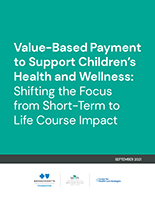

Value-Based Payment to Support Children’s Health and Wellness: Shifting the Focus from Short-Term to Life Course Impact
Health care payers, providers, and policymakers are increasingly pursuing value-based payment (VBP) to improve the quality of care and population health while controlling rising health care costs. When implemented in Medicaid, VBP programs often include children and adults in the same model, though these models may not fully account for children’s distinct health needs.
This report seeks to inform the work of Massachusetts policymakers and stakeholders to better incorporate children’s health needs and experiences within the payment models in the MassHealth Accountable Care Organization (ACO) Program by examining lessons from states and providers throughout the country. Based on the results of an environmental scan, including a review of peer-reviewed and gray literature and interviews with 18 subject matter experts, this report identifies and describes four main VBP approaches for delivering care to pediatric populations. The authors then synthesize key themes and lessons learned for successfully implementing VBP models for children. These findings suggest there is great opportunity for Massachusetts to serve as a leader in this field, and the report lays out a set of policy and program considerations to help Massachusetts design an approach to better serving children within and alongside the framework of the existing ACO Program. Ultimately, adapting VBP for pediatric populations requires recognition that pediatric VBP models should not be focused on short-term savings but rather on improving quality of care to support child health and long-term population health outcomes.
